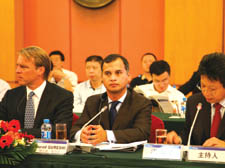|
|
 |
| |

Murad Qureshi at a conference after the Olympics |
It’s a gold medal for China, the next international superpower
After returning from the Beijing Olympics, Murad Qureshi believes the host nation showed it is ready to emerge as a major world player following a stunning games
THE spectacular Beijing games of the 29th Olympiad were an enthralling sporting festival.
Over 16 days we saw such dramas unfold in the Bird’s Nest stadium as the performances of the fastest man in the world, Usain Bolt of Jamaica. In the Water Cube pool we had similar outstanding performances by the US swimmer Michael Phelps with his personal haul of eight golds, meriting a separate entry in the medals table on his own! This while the Chinese lost their “pin-up” boy Liu Xiang who pulled out of the 110 metres hurdles – the only real shock the hosts suffered as they emerged as a sporting superpower at these games.
As for Team GB’s performance, it surprised everyone, none more so than the British themselves who are in a collective state of national shock. Finishing fourth in the medals table with 19 golds, behind only China, USA and Russia, is the country’s best performance for a 100 years.
Neither, mercifully, were the games affected by many doping scandals. Yet the background against which Beijing staged the Olympics was dominated by fears of pollution, worries about security and protests about China’s human rights record.
Beijing bashers said that the air pollution would affect the performance of top athletes. This has quite clearly not been the case, as 43 world records and 120 Olympic records were shattered in the course of the Beijing games.
For residents there may indeed be long-term effects which are not apparent yet, but with initiatives such as the major investment in eco-friendly technology to process 90 per cent of the city’s wastewater, Beijingers’ quality of life is improving on other fronts not noticed by the world.
As for security, we were thankfully spared any major incidents and as a spectator I certainly felt comfortable in all the venues and transport facilities that I used. Moreover, the security presence was not heavy handed or actually visible to the naked eye. If anything, we were more anxious about what wars politicians were starting during the opening ceremony, when the eyes of the world were on China and not them.
With regard to human rights, even the Mayor of London stated that it would be deeply counter-productive to showboat and grab UK headlines at a time when China was opening up, and there was general agreement that the games should be used to encourage understanding between China and the rest of the world.
As the China Daily newspaper stated, the games were a historic climax of three decades of China engaging with the world after a long period of defensive isolation. It should not be forgotten that it was China’s experience during the opium wars of the 19th century, waged by the west in the name of free trade, that helped close the doors in the first place.
At the same time, while China has had to open up as a result of hosting the games, it was unrealistic to expect the event to achieve what world leaders have failed to do, and persuade the Chinese government to adopt the degree of liberalisation favoured by the west.
It was also notable that those who wanted to impose a blockade on China in the name of human rights showed little interest in workers’ rights. The outdated registration law that deprives migrant workers in the capital of rights and benefits enjoyed by permanent residents, which is the subject of popular discussion on the streets of Beijing itself, has been ignored by China’s western critics.
Comparisons with Berlin 1936, which some made at the outset of these games, are wrong. In many ways these games were more akin to Tokyo 1964 and Seoul 1988, as we see not only a new sporting superpower arising, but an economic one as well. So do not be surprised to see high-quality manufactured Chinese brands like Haier, the household goods supplier, undercutting others in these markets; Li Ning, the sportswear supplier challenging the global monopoly control of Nike and Adidas; and Chinese beers like Tsingtao and Yanjing on our shelves soon.
A similar development occurred after the Tokyo and Seoul games when we began seeing high-quality goods and services from Japan and South Korea, in contrast to their earlier reputation as manufacturers of cheap, low-quality goods.
But this time, I suspect, it will be done on a much larger scale.
Finally, one cannot fail to say something about the amazing Bird’s Nest stadium itself.
There is no doubt that with this stadium the Chinese have created an iconic building, which will in time become comparable to the image of the Taj Mahal as a symbol of India.
It will prove priceless in the years to come, as it embodies the emerging new China.
|
 |
|
| |
| Your comments: |
| |
| |
| |
|
 |
|